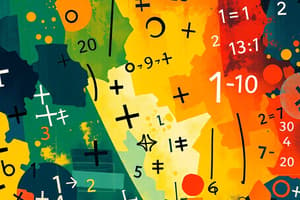Podcast
Questions and Answers
Which of the following represents the percentage formula for finding an unknown value?
Which of the following represents the percentage formula for finding an unknown value?
- Part = Base × Rate
- Part = Rate × Base (correct)
- Rate = Part ÷ Base
- Base = Part ÷ Rate
If you convert 0.75 into a fraction, what is the simplest form of that fraction?
If you convert 0.75 into a fraction, what is the simplest form of that fraction?
- 1/4
- 7/10
- 3/5
- 3/4 (correct)
Which operation would you use to simplify the fraction 12/16?
Which operation would you use to simplify the fraction 12/16?
- Multiplication of the numerator with the denominator
- Addition of the numerator and denominator
- Division of the numerator and denominator by their greatest common factor (correct)
- Subtraction of the denominator from the numerator
How would you calculate simple interest on an investment of $1,000 at an interest rate of 5% over 3 years?
How would you calculate simple interest on an investment of $1,000 at an interest rate of 5% over 3 years?
What is one of the consequences for competitors who do not follow the Dress Code?
What is one of the consequences for competitors who do not follow the Dress Code?
Which of the following is NOT a basic math concept detailed in the guidelines?
Which of the following is NOT a basic math concept detailed in the guidelines?
What must competitors do with electronic devices before the competition begins?
What must competitors do with electronic devices before the competition begins?
What should competitors analyze in problem statements?
What should competitors analyze in problem statements?
Which operation is recognized as the inverse of multiplication?
Which operation is recognized as the inverse of multiplication?
What is required when submitting accommodation requests for disabilities?
What is required when submitting accommodation requests for disabilities?
Which of the following methods is NOT appropriate for computing with whole numbers?
Which of the following methods is NOT appropriate for computing with whole numbers?
What is the purpose of estimating the results of rational number computations?
What is the purpose of estimating the results of rational number computations?
Which of the following is NOT a correct method for calculating the total purchase price with interest added?
Which of the following is NOT a correct method for calculating the total purchase price with interest added?
What is the primary difference between a simple average and a weighted average?
What is the primary difference between a simple average and a weighted average?
Which calculation would most likely involve finding the finance charge for a single payment loan?
Which calculation would most likely involve finding the finance charge for a single payment loan?
When calculating discounts, what is the first step in determining the net selling price after a chain discount?
When calculating discounts, what is the first step in determining the net selling price after a chain discount?
Which method would NOT be appropriate for computing the cost of owning and buying an automobile?
Which method would NOT be appropriate for computing the cost of owning and buying an automobile?
What does the average daily balance method calculate?
What does the average daily balance method calculate?
Which of the following steps is essential when constructing a graph from a data set?
Which of the following steps is essential when constructing a graph from a data set?
Which calculation involves converting a decimal to a fraction?
Which calculation involves converting a decimal to a fraction?
Flashcards are hidden until you start studying
Study Notes
Study Topics
Basic Math Concepts
- Understand operations: addition, subtraction, multiplication, division (whole numbers, fractions, decimals). These fundamental operations form the backbone of mathematics. Mastery of these skills allows for the resolution of complex mathematical problems that may arise in everyday contexts, particularly in business and financial situations.
- Solve practical problems in business (e.g., budgeting, taxes). The application of basic math concepts is crucial for effective management of financial aspects within a business environment, including creating budgets that align with strategic goals and understanding the implications of taxes on overall profitability.
Consumer Credit
- Differentiate types of credit, their costs, and benefits. Understanding the various types of credit—such as revolving credit, installment loans, and secured versus unsecured loans—enables consumers to make informed decisions that align with their financial circumstances and goals.
- Calculate sales tax and total price with interest. This includes not only understanding how to compute sales tax for items purchased but also grasping how interest impacts the total cost over the life of a loan or credit account, which is vital for budgeting and financial planning.
- Understand financing options for consumer purchases. Familiarity with different financing avenues such as personal loans, credit cards, and financing through retailers empowers consumers to choose the most suitable option based on their financial situation, ensuring that they can efficiently manage purchases without incurring excessive debt.
Data Analysis and Probability
- Calculate and analyze mean, median, and mode. These statistical measures are essential in understanding data sets and can offer insights into trends and patterns within various sectors, including economics and business analysis.
- Construct and interpret various data visualizations (charts, graphs). Skills in data visualization make complex data more comprehensible. Tools such as bar graphs, pie charts, and line graphs can reveal insights quickly and facilitate effective communication of data findings to stakeholders.
Decimals and Fractions
- Perform operations (addition, subtraction, multiplication, division) with decimals and fractions. These operations are essential for working with measurements and financial calculations, which often involve precise decimal points and fractional values.
- Convert between fractions and decimals, and understand place value. Being proficient in converting between these two forms is important for comprehensive financial understanding, particularly when dealing with percentages, ratios, and proportions.
Percentages
- Define base, rate, and percentage; solve related problems. A thorough grasp of these concepts enables individuals to effectively analyze discounts, interest rates, and other financial rates, which are ubiquitous in personal and business finance.
- Calculate markup, markdown, and simple interest. Being able to compute markup and markdown is vital for pricing strategies in commerce, while understanding simple interest is essential for evaluating loans and savings accounts.
Important Documents
- Familiarize with the Competitive Events Policy & Procedures Manual, Honor Code, Code of Conduct, and Dress Code. A solid understanding of these documents ensures that individuals adhere to the required standards and behaviors expected in academic or competitive environments, promoting a culture of integrity and professionalism.
Studying That Suits You
Use AI to generate personalized quizzes and flashcards to suit your learning preferences.




